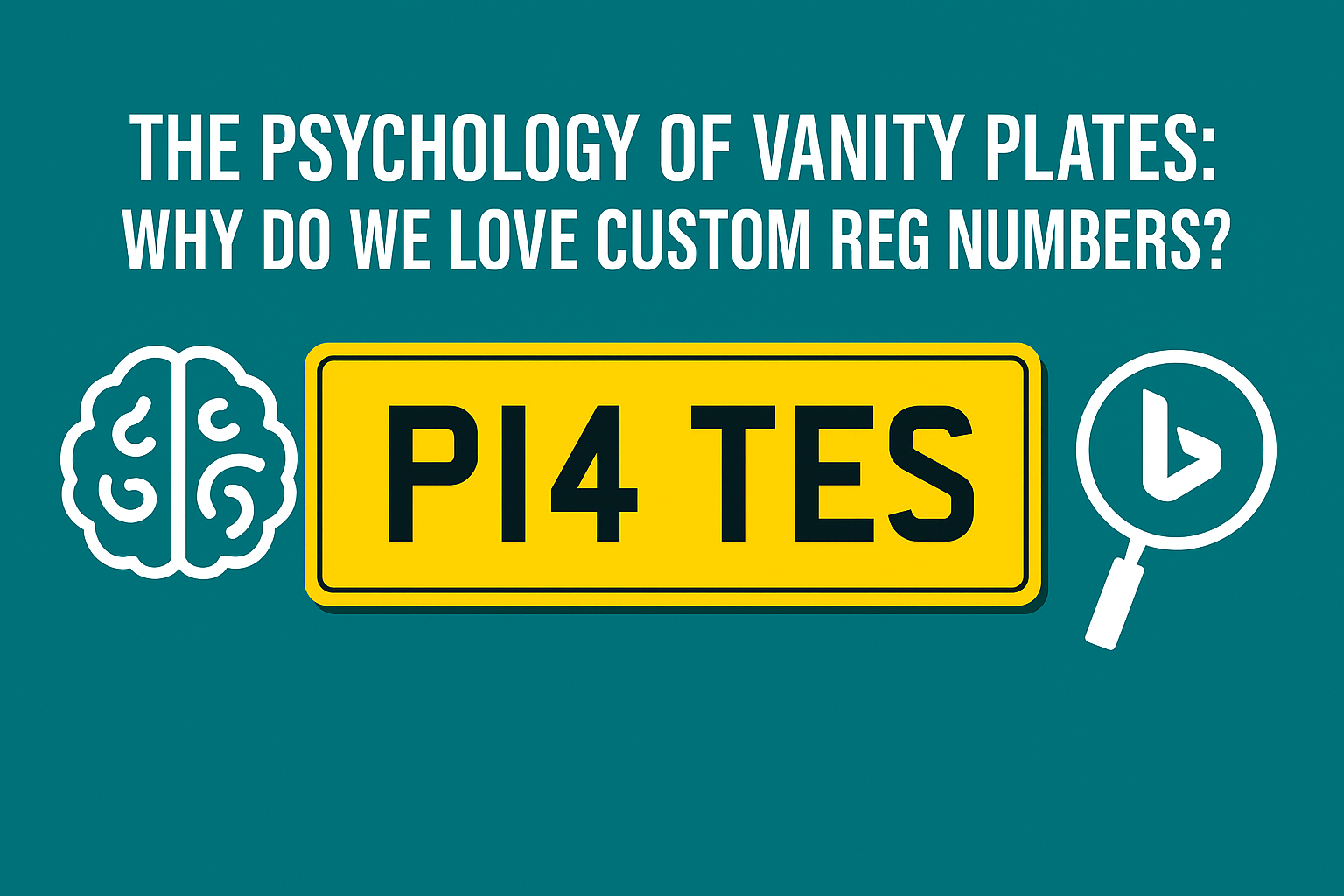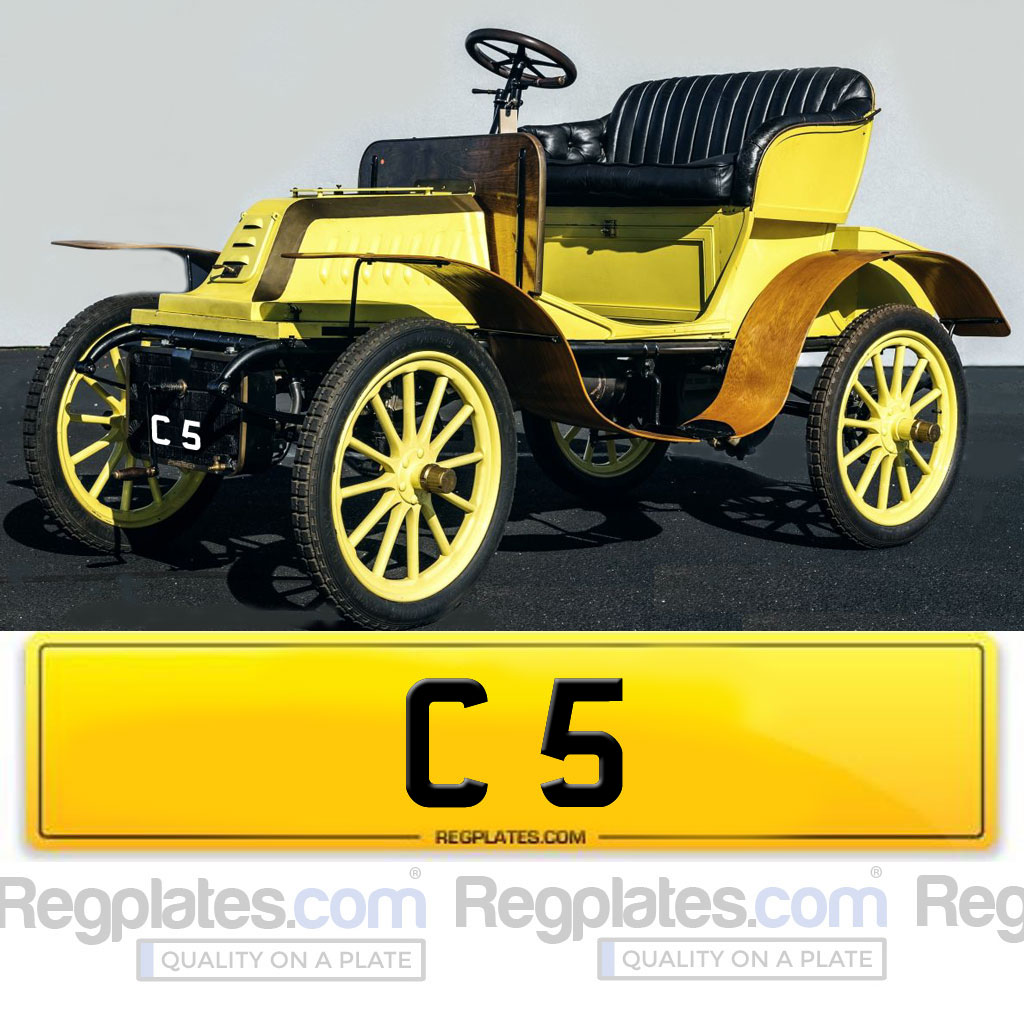
Personalised plates are more than just a quirky automotive accessory—they’re a powerful form of self-expression, identity signalling, and emotional connection. From status and humour to tribalism and territoriality, custom reg numbers tap into deep psychological drivers. This article explores why we love them, what they say about us, and how they shape our behaviour on the road.
Personalised number plates have long been a symbol of individuality, prestige, and creativity. Whether it’s a cheeky pun, a nod to a profession, or a tribute to a loved one, vanity plates offer drivers a unique way to stand out. But beneath the surface of clever combinations and eye-catching designs lies a deeper question: why do we care so much about what our plates say?
Let’s explore the psychological forces that make custom registration numbers so compelling—and why they continue to thrive in the UK automotive culture.
1. Identity and Self-Expression
At the heart of vanity plates is the desire to express who we are. Much like fashion, tattoos, or social media bios, custom plates allow us to broadcast our personality to the world—without saying a word.
- Individuality: A plate like “GYM 80Y” or “D12 WHO” tells others something about the driver’s interests, values, or sense of humour.
- Creativity: Crafting a clever plate requires linguistic play, cultural awareness, and a dash of wit—traits many owners take pride in.
- Status Signalling: Plates such as “CEO 1” or “BO 55” can subtly (or not-so-subtly) communicate success, wealth, or aspiration.
Psychologists call this “identity signalling”—the act of using visible cues to convey who we are or who we want to be perceived as. Vanity plates are a perfect vehicle (pun intended) for this.
2. Emotional Attachment and Ownership
Studies have shown that people who personalise their vehicles—whether through plates, bumper stickers, or decals—tend to feel a stronger emotional bond with them. This phenomenon is known as the “endowment effect,” where we value things more simply because they’re ours.
Custom plates deepen this bond by making the car feel like an extension of the self. It’s no longer just a mode of transport—it’s a reflection of identity, a mobile billboard of personality.
This emotional attachment also explains why some people go to great lengths (and expense) to secure rare or meaningful plates. It’s not just about the plate—it’s about what it represents.
3. Social Connection and Tribalism
Vanity plates can also foster a sense of community. Whether it’s a shared interest (“GO11 FER”), a regional nod (“HUI 1”), or a club affiliation (“M3 BMW”), plates can act as tribal markers—signalling belonging to a group.
- Conversation Starters: Unique plates often spark curiosity, leading to interactions at petrol stations, car meets, or online forums.
- Shared Identity: Plates that reflect hobbies or professions can create instant rapport among like-minded individuals.
- Cultural Significance: In the UK, plates tied to football clubs, local slang, or national pride often carry deeper meaning.
Auction number plates can be a good value way to add that finishing touch to your vehicle. This social dimension adds another layer to the appeal: vanity plates aren’t just about standing out—they’re also about connecting.
4. Territoriality and Road Behaviour
Interestingly, research suggests that personalised plates may influence how drivers behave on the road. A study cited by Car Throttle found that drivers with more customised vehicles—including vanity plates—were more likely to exhibit territorial behaviour.
This includes:
- Guarding their lane more aggressively
- Reacting strongly to perceived “invasions” (e.g., tailgating)
- Displaying more road rage tendencies
Why? Because the car becomes a personal space—an extension of the self. When someone cuts you off, it’s not just a driving manoeuvre—it feels like a personal affront.
This territorial instinct is deeply rooted in human psychology, and vanity plates may amplify it by increasing the emotional investment in the vehicle.
5. Prestige and Investment Value
Let’s not forget the financial side. In the UK, rare and desirable plates can fetch tens or even hundreds of thousands of pounds. Plates like “F 1” or “VIP 1” are seen as status symbols, akin to luxury watches or supercars.
- Scarcity: The limited nature of certain combinations drives up demand.
- Legacy: Some plates are passed down through generations, becoming family heirlooms.
- Branding: Businesses often use plates like “P1 UMB ” or “LOD 6E” as mobile advertising tools.
This blend of prestige and practicality makes personalised car plates a unique asset class—one that’s both emotionally and financially rewarding.
6. Humour and Playfulness
Not all plates are serious. In fact, some of the most memorable ones are downright hilarious. From cheeky puns (“BO55 MAN”) to self-deprecating jokes (“5 LOW”), humour plays a big role in the psychology of vanity plates.
- Positive Attention: Funny plates make people smile, creating a ripple of goodwill on the road.
- Cognitive Play: Decoding clever plates engages the brain, making them more memorable.
- Social Commentary: Some plates offer satirical takes on politics, pop culture, or everyday life.
This playful aspect taps into our love of wordplay and wit—making driving a little more entertaining for everyone.
7. Personal Branding in the Digital Age
In today’s world of Instagram reels and TikTok car tours, vanity plates have become part of personal branding. Influencers, entrepreneurs, and content creators use them to reinforce their identity and stand out in a crowded digital landscape.
- Memorability: A plate like “M12 BOB” or “ECO 1F” sticks in the mind—and the algorithm.
- Professionalism: Custom plates can elevate a brand’s image, especially in industries like real estate, trades, or luxury services.
- Cross-Platform Recognition: Matching your plate to your social handle creates a cohesive brand experience.
For businesses and creators alike, vanity plates are no longer just a novelty—they’re a strategic asset.
8. Cognitive Biases and Plate Selection
The process of choosing a plate is itself a psychological journey. It involves:
- Confirmation Bias: We tend to favour plates that reinforce our existing beliefs or identity.
- Optimism Bias: We believe our plate will be well-received, even if it’s obscure or niche.
- Anchoring: The first idea we have often influences the final choice, even if better options exist.
Understanding these biases can help buyers make more informed decisions—and avoid costly mistakes.
Final Thoughts: More Than Just Letters and Numbers
Vanity plates are a fascinating intersection of psychology, culture, and commerce. They reflect our desire to be seen, understood, and remembered. Whether it’s for fun, pride, or profit, custom reg numbers offer a unique canvas for self-expression.
At Regplates.com, we’ve seen first hand how meaningful these plates can be—from heartfelt tributes to bold branding statements. If you’re considering a personalised plate, you’re not just buying a product—you’re investing in a story.

Jon Cherry is a Director of leading personalised number plate dealer Regplates.com. Jon has over 25 years industry experience handling some of the most expensive plates ever sold with many high profile and celebrity clients. Active since 1991 in the number plate industry, Jon is currently Chairman of the Cherished Numbers Guild, a trade body representing number plate dealers in the UK. Jon has written many articles on the industry and insight into the future of numberplates and the market as a whole.




